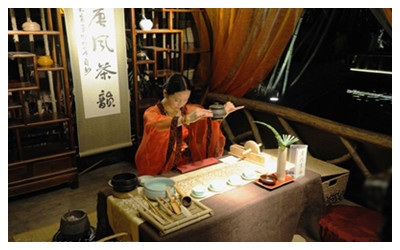
Chinese Behavior Custom
 With a move to a more cosmopolitan culture particularly in cities some customs and traditions are in steep decline, however they are still of great value when traveling in China as the locals will appreciate respect for their age-old customs. There are variations in tradition across China particularly within ethnic minorities who have their own distinct culture; so it is important to remember that not all these customs are universal.
With a move to a more cosmopolitan culture particularly in cities some customs and traditions are in steep decline, however they are still of great value when traveling in China as the locals will appreciate respect for their age-old customs. There are variations in tradition across China particularly within ethnic minorities who have their own distinct culture; so it is important to remember that not all these customs are universal.
(1) Forbearance in public
忍 rěn, roughly means forbearance or putting up with things without protesting, is an important highly regarded quality in China. Part of this has its roots in history, for a long time a whole family was punished for the crimes of one individual, ignorance was not a defense, so reticence in saying anything definite became a natural attitude. Losing ones temper is never a good idea, it is seen as a lack of self control and rarely yields a good result as the recipient would lose 'face' if they accept blame.
Chinese people are restrained in showing affection in public. Maintaining eye contact is considered intrusive and a physical embrace is reserved for close relationships. Shaking hands is now commonly used for formal business meetings, it is something that Chinese expect to do with foreigners but it is not traditional. Things you take for granted have only recently accepted in China, for instance clapping hands used to be used to drive out evil spirits not to show appreciation. Facial expressions are kept to a minimum and these characteristics have made foreigners use the term ‘inscrutable’ to describe the lack of apparent reaction. Often careful analysis of a conversation is needed to assess a person's true feelings.
(2) No Spittingis in public
Spitting is a cultural tradition of China, it was considered unhealthy to swallow spittle. At present, spitting is something that still occurs particularly in rural areas, but the government has been tried to reduce spitting in public. In any Chinese city, there is a rule that spitting in public is forbidden.
(3) No Blowing nose in public
In past time, the trditional way for people to blow nose was using cotton handkerchiefs. Nowadays, paper of napkin is popular used.Reusable cotton handkerchiefs are considered particularly vile.
(4) No Smoking in public
China has the unenviable position as the top tobacco consuming nation. Cigarette smoking is very prevalent in China, but there are bans on smoking in some public places, such as in scenic spots, public bus, train, etc.
(5) Taking a shower after work
It is traditional for Chinese people to take a shower after work before going out in the evening, and also before bedtime. This reflects the often hot and humid climate and contrasts with the Western habit of a morning shower.
(6) Be careful what you say
It is quite common for conversation to immediately get much more personal than would be normal to Westerners. While two Westerners may still be talking about the weather Chinese will be asking questions about age, salary, marital status and health. Chinese are keen amateur doctors and will often interrogate you if you say you are feeling unwell and offer advice on treatment. However most Chinese will feel uncomfortable talking about politics, this topic should be reserved for people you get to know very well.
(7) Queuing in China
Traditionally queuing in line for services was unknown, everyone just barged forward. In the last decades the culture of waiting in turn has become firmly established but not everywhere, it may still be necessary to push and shove, for example getting onto an already overcrowded bus!
(8) Modesty is a good manner
Chinese regarded that modesty is a traditional good manner of a people. For exmple, many responses in conversation will display modesty and humility. The standard response to a thank you 谢谢 xiè xie in Chinese is to respond with no need to thank 不谢 bù xiè . This attitude is very prevalent, and this humility helps to reduce competitiveness and eases relationships.
(9) Sexual is secret for Chinese.
In China,historical attitude to sex has been to use metaphor and innuendo rather than direct reference. Symbolism is often used and so the hidden meaning of objects in paintings and gifts has to be taken into account. Nowadays, many younger single people wear more fashionable clothes. Sometimes the characteristic black hair of Chinese is bleached, married people tend to dress conservatively in restrained colors.However, it is not acceptable in China to overt sexual advances towards any strangers
If traveling in China, a level of modesty is expected even on beaches, Chinese do not have a tradition of naked bathing because nakedness is still a strong taboo. At temples of any religion tourists are expected to dress respectfully, at least covering the upper arms.
(10) Bowing
To indicate deep respect and appreciation the Chinese may make the traditional gesture of cuping a fist with the other hand.







 Ask Questions ?
Ask Questions ?